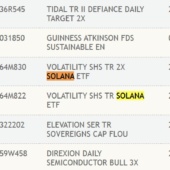Martin Pelletier: Years of great returns from volatile investments can still erode your portfolio through the damage of down years

Article content
“The devil appeared to a monk disguised as an angel of light, and said to him, ‘I am the angel Gabriel, and I have been sent to you.’ But the monk said, ‘Are you sure you weren’t sent to someone else? I am not worthy to have an angel sent to me.’ At that the devil vanished.” — Nun and theologian Benedicta Ward
When it comes to life, I truly believe the greatest evil among us is pride. It is the root of so much damage (as evident by what we’ve been witnessing in Ottawa and the resulting economic damage.)
Advertisement 2
Article content
Pride is also very destructive when it comes to investing, as it motivates us to take risks when we really shouldn’t, just because we’re not satisfied until we’re doing better than someone else.
Unfortunately, the investment industry knows the power of this motivation and harnesses it to secure your business. We are currently seeing an abundance of marketing by fund managers and advisors selling their performance over the past two years while downplaying what happened in 2022 as markets plummeted.
Article content
This is a shame, as the real value of an investment manager can be seen in years like that. This is because it takes real skill to manage risk alongside return, and touting performance numbers delivered during a bull market does little to demonstrate that.
Our friends over at Outcome Metric Asset Management LP recently provided an excellent overview of the importance of understanding the relationship between risk and return. They show two portfolios with dramatically different return profiles and yet the one with a significantly higher sum of returns over some very good years still generated a lower portfolio value. This is the effect volatility can have on a portfolio over time.

Downside protection is imperative because when you lose money you have to generate a higher return to make it back. So with a loss of 30 per cent, you need a gain of about 43 per cent to get back to even. A loss of 40 per cent needs a gain of about 67 per cent to be made whole and if you lose half your money you need to double what you have left to get back to where you started.
When taking out money from your portfolio, the pattern of returns can have an even greater impact, as it’s entirely possible to have two portfolios with the same annual rate of return but with a dramatic difference in final value simply due to the timing and pattern of realized yearly returns.
This is something never talked about during raging bull markets. Many are currently looking at the S&P 500’s return and plowing their money into it and its heavily weighted stocks, like Nvidia Corp., that are dominating the index. It’s hard to blame them, as we just had a year where the S&P 500 has closed at an all-time high 50 times, where on average it has done so only 18 times each year.
Advertisement 3
Article content
With the upcoming change in the U.S. government, there are a lot of positive factors that could push U.S. markets that much higher and there is no shortage of market strategists telling you that. You had better get on board, otherwise you will be left behind and miss out on another year of strong returns, many are urging.
We think this is already starting to impact asset managers, as those not investing in the hottest stocks or segments of the market will risk losing clients, but in doing so, add risk into portfolios at the wrong time for fear of missing out.
Recommended from Editorial
This is why we’re fans of goals-based investing. It isn’t about beating everyone else or piling on to whatever is the top performing index but rather designing a portfolio to meet a desired value while minimizing the ups and downs along the way. Boring isn’t sexy, it won’t let you brag to your friend, but it does get the job done — and that’s the bottom line.
Martin Pelletier, CFA, is a senior portfolio manager at Wellington-Altus Private Counsel Inc., operating as TriVest Wealth Counsel, a private client and institutional investment firm specializing in discretionary risk-managed portfolios, investment audit/oversight and advanced tax, estate and wealth planning. The opinions expressed are not necessarily those of Wellington-Altus.
_____________________________________________________________
If you like this story, sign up for the FP Investor Newsletter.
_____________________________________________________________
Bookmark our website and support our journalism: Don’t miss the business news you need to know — add financialpost.com to your bookmarks and sign up for our newsletters here.
Article content


















